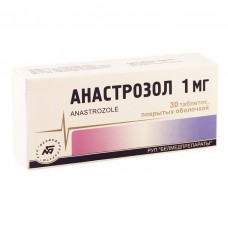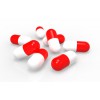Expiration date: 09/2026
Pharmacological action
Antitumor agent. It is a selective nonsteroidal aromatase inhibitor. In postmenopausal estradiol is mainly formed from estron, which is produced in peripheral tissues by conversion from Androstenedione (with the participation of the enzyme aromatase). Reducing the level of circulating estradiol has a therapeutic effect in women with breast cancer. In postmenopausal anastrozole in a daily dose of 1 mg causes a decrease in the level of estradiol by 80%. Anastrozole does not have progestogenic, androgenic and estrogenic activity, in therapeutic doses does not affect the secretion of cortisol and aldosterone.
Pharmacokinetics
After oral administration, anastrozole is rapidly absorbed from the gastrointestinal tract. Cmax in plasma is achieved within 2 h (fasting). Food slightly reduces the rate but not extent of absorption. Plasma protein binding is 40%. There is no information about cumulation.
Anastrozole metabolism is accomplished by N-dealkylation, hydroxylation, and glucuronidation. Triazole, the main metabolite determined in plasma and urine, does not inhibit aromatase.
Anastrozole and its metabolites are excreted mainly in the urine (less than 10% - unchanged), within 72 hours after a single dose. T1 / 2 of plasma-40-50 no.
Clearance of anastrozole after oral administration in volunteers with stabilized liver cirrhosis or renal dysfunction does not differ from the clearance determined in healthy volunteers.
Pharmacokinetics of anastrozole in postmenopausal women does not change.
Dosage
Inside-1 mg 1 time / day.
Drug interaction
Anastrozole reduces the effectiveness of estrogen.
Clinical studies have shown that while the use of anastrozole with antipyrine and cimetidine drug interaction due to the induction of microsomal liver enzymes is unlikely.
Pregnancy and lactation
Contraindicated in pregnancy and lactation.
Side effect
From the endocrine system: "tides", vaginal dryness and thinning of hair.
From the digestive system: anorexia, nausea, vomiting, diarrhea. In patients with advanced breast cancer in most cases with liver metastases there was an increase in the level of GGT, less often-schf.
CNS: asthenia, drowsiness, headache.
Metabolism: slight rise in total cholesterol.
Allergic reactions: skin rash.
Indications
Postmenopausal breast cancer.
Contraindications
The period of premenopause, severe renal failure (CC less than 20 ml/min), moderate and severe liver failure, pregnancy, lactation, childhood, increased sensitivity to anastrozole.
Special instruction
In case of uncertainty of the hormonal status of the patient, the state of menopause should be confirmed by additional biochemical studies.
The safety of anastrozole in patients with moderate hepatic impairment has not been established.
Anastrozole should not be used simultaneously with estrogen.
Impact on the ability to drive and operate machinery
During treatment should not perform work that requires high concentration and rapid psychomotor reactions.
In violation of kidney function
Contraindications: severe renal failure (CC less than 20 ml/min).
In violation of liver function
Contraindications: moderate and severe liver failure.
Use in childhood
Contraindication: children's age.



